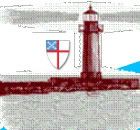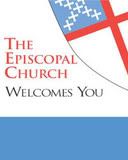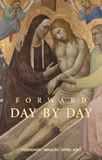St. James' Episcopal Church
Goshen, Indiana
Our 164th Year
Saturday, October 20, 2007
Sermon for October 21st, 2007
Sermon for October 21st, 2007
St. James - Goshen, IN
Arthur Hadley
We have returned to the long story of the family of Abraham, Isaac and Jacob. Today in the first lesson we heard about Jacob returning to the promised land having lived is exile since he stole or a least tricked his father, Isaac, into giving him the birth right of the older son
Esau. You remember that story how Jacob tricked his blind father in to giving him the blessing and birthright by pretending to be the older brother. Anyway, the trickster, Jacob had to flee to live with his mother’s brother. There Jacob fell in love with his uncle’s younger daughter and wanted to marry her. Good old uncle agreed if Jacob would work for him for seven years, but at the wedding it was the older daughter that was the bride. So Jacob worked seven more years in order to marry the girl of his dreams. Well now Jacob wanted to return to his homeland, and claim the birthright that he had tricked his father into giving. So coming to the Jordan river Jacob was about to face his brother Esau coming with 400 men. Jacob assumes that Esau might still be angry about losing his birthright all those years ago, now that Jacob was coming to claim it. Jacob figures that if he divides his herds, and flock and his two wives into two different camps, Esau and his army of 400 might not destroy all that Jacob owns. And then he has a dream and wrestles with God. In the all night wrestling match God changes Jacob’s name to Israel and blesses him. A blessing or oath given while holding “the hollow of a man’s thigh” passed from generation to generation. So in this story God blesses the family of Israel from generation to generation as the family of God. So Jacob, the trickster, and then the tricked, is renamed and blessed by God to be the Family of God. Therefore, the family of Esau is left behind not receiving the inheritance of his father Isaac, and his grandfather Abraham. The children of Jacob, henceforth Israel, get it all. This is a story of the separation of Arabs, descendents of Abraham’s first child, and the descendents of Esau, the Philistines.
Now in the second lesson Paul wrote that “All scripture is inspired by God and profitable for teaching.” First let’s try to understand what Paul is writing about, All Scripture. At the time of Paul there was no “New Testament” and there was no “Old Testament”. At that time there were scriptures… writings including the first five books of what we now call the Bible; these five books are sometimes called the Torah, or the Law. Let’s see if you can name the first five books - Genesis, Exodus, Leviticus, Numbers, and Deuteronomy. Deuteronomy does not show up until the remnant from the Babylonian captivity return to Jerusalem 3rd century before Jesus was born. Sometimes in the Gospels you read about the Law and the Prophets, and certainly Jesus read from the scroll of the Prophet Isaiah. And certainly Jesus and Paul knew the Psalms, but maybe not just the way we have the psalms in the Bible. The Bible as we know it was not fixed until the 4th century after the death of Jesus and Paul. So we can not be certain what All Scripture to Paul might have been. Torah, some prophets, some psalms.
But anyway all scripture is inspired by God and profitable for teaching. Paul is not proclaiming infallibility of Scripture. And good grief do not look at the family of Abraham, Isaac and Jacob, as a godly example of the good family. What a bunch of liars, murders, thieves, adulters and general sinners the family of God was, and is.
The Bible is not our only source of authority. The Bible can never stand alone. After all while inspired by God, it was written by people and then the scriptures were selected by other people much later. The selection of scripture was based on Tradition and Reason. So Tradition and Reason actually come before Scripture is establishing authority. When the Anglican Church was being formed, reformed from western European Christian traditions, Bishop Richard Hooker formulated a statement on Authority as being equally based on Bible, Tradition and Reason. He alluded to the three legged stool, a great image. Each of the legs must be the same length of the stool will be tipped.
The Church regularly gets into trouble when Authority sits upon a tipped stool giving greater authority to Bible, or Tradition or Reason.
May we always strive for balance.
Thanks Be to God.
Subscribe to Posts [Atom]








